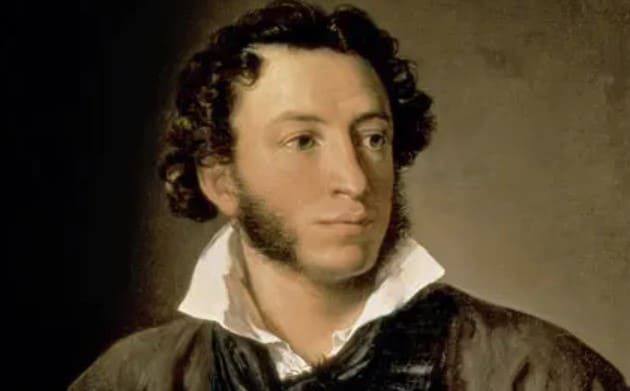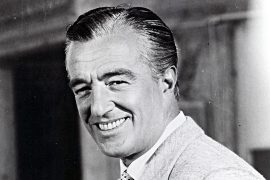The Russian writer is one of the most important poets in Russia, who also achieved great importance in world literature. Alexander Sergeyevich Pushkin became the national poet and the founder of modern Russian literature. He achieved special merits in the lyrical and epic genres, which he brought to a climax in Russian literature. His style of expression and content significantly influenced subsequent generations of poets. The maxims of his writing style followed a concise expression with maximum content. Of great importance are Pushkin’s dramatic works, his literary-historical, critical and historical essays…
Alexander Sergeyevich Pushkin was born in Moscow on June 6, 1799 as a member of an old noble family.
On his mother’s side he was the great-grandson of Hannibal, the Moor of Emperor Peter the Great. Alexander Pushkin attended the Lyceum in Tsarskoye Selo from 1811 to 1817. The first poem with which he went public dates back to 1814. The theme of his first works was dedicated to the love experience, which was also associated with the fear of rejection. In 1817 he joined the literary society “Arzamas” and then moved to the circle “Seljonaja lampa”. In the same year he entered the “College for Foreign Affairs” in the civil service. In addition to his love poetry, Pushkin also wrote his first political epigrams, which advocated a constitutional constitution in Russia.
The ode “Volnost” was written in this way as early as 1817. The poet was banned from Petersburg for his political views, which led to the officers’ uprising of 1825. In 1820 his work “Russia and Ludmilla” was published. Following his departure from St. Petersburg, he undertook numerous journeys that took him through the Caucasus and the Crimea, among other places. Important works such as “The Prisoner in the Caucasus” (1821) or “The Fountain of Bachèisaraj” (1822) were also created there. In their style as verse epics and their subject matter, these early works are still based on European Romanticism. After he was transferred to Odessa as a disciplinary measure, work began on his main work “Evgeny Onegin”. In its verse structure, the novel allows the distinction between prose and bound language to disappear.
In this way he draws an ironically colored contemporary and social document. In 1824 Pushkin had to leave the civil service. He stayed until 1826 on his mother’s estate in Michajlovskoe near Pskov. There he became familiar with the language of the common people, which then also became the characteristic of his literary style in the mixture with chancellery and church language. In doing so, Pushkin helped this stylistic aesthetic to world fame in the literary language. In the style of folk poetry, he wrote the tragedy “Boris Godunov” (1825) at the suggestion of Shakespeare. At the behest of Tsar Nicholas I, Pushkin returned to Petersburg after the failed Decembrist uprising of 1825. There he lived as a freelance writer. The connection to the Tsar’s court actually meant an intended censorship observation.
The subject of censorship also crops up again and again in his works. In 1831 he married Natalia Goncharova. In order to be able to feed his large family, he switched back to secure civil service. The couple moved to Petersburg in 1831, where, with the support of Goncharova’s wealthy relatives, they were able to participate in the glamorous life of the Tsarist court, which frustrated Pushkin, who yearned for independence. His works during this time were created under great psychological pressure. As a poet, he turned to narrative technique at this time. His prose works, such as the title “Belkin’s Tales” (1831), were primarily characterized by their vernacular character. In 1833 his work “The Copper Rider” was published, which was rejected by the Tsar’s court because of its originality and complexity.
In the same year, the historical short novel “The Captain’s Daughter” was written. Three years later, Pushkin founded the magazine “Sovremennik”. Pushkin’s literary motif, the duel, caught up with him in reality in a bitter way.
Alexander Sergeyevich Pushkin died on February 10, 1837 at the age of thirty-eight as a result of a duel in St. Petersburg.
The circumstances leading to the occurrence of this deadly encounter have not been fully elucidated to this day and contribute to the myth of the Russian poet.
How did Pushkin die?
Lying on the ground – the gun had fallen out of his hand and had to be handed another one – the badly wounded Pushkin also fired a shot, but only slightly injured his opponent. He himself succumbed to his injuries two days later at the age of thirty-seven.
Where is Alexander Pushkin from?
Moscow, Russia
When did Pushkin die?
February 10, 1837
Was Alexander Pushkin black?
The unusual path of life impressed Alexander Puschkin, who believed he had inherited his dark skin and full, black hair, but also his unbridled temperament from this same Hannibal – years later he dedicated the story Peter the Great to him.
Which writer died in a duel?
Mikhail Lermontov was not only a gifted poet, but also a painter. Numerous watercolors and pencil drawings, often with motifs from the Caucasus landscapes, have survived alongside his poetic work. The representative of Russian romanticism died 175 years ago today – in a duel in the Caucasus.





